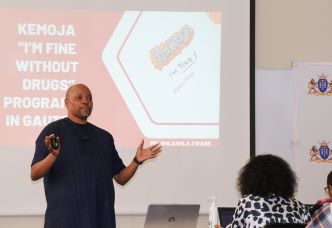Department of Social Development 2024/04/14 - 22:00

A workshop was held with relevant staff from the Gauteng Department of Social Development, Education, Health, and African Youth Development Forum to evaluate the implementation of the Ke Moja campaign aimed at reducing drugs among the youth at Solomon Stix Morewa Clinix Hospital in Johannesburg on Thursday, 11 April 2024.
"Ke Moja" is a colloquialism meaning "no thanks, I am fine". The word "moja" is a South African colloquial language which means "Fine" while "Ke" is the "Sesotho" language which means "I". In 2003, the Minister of Social Development launched "Ke Moja" as a National Campaign.
South African government is aimed at reducing the demands of drugs among the youth by empowering them to make informed choices and resist being pressured into taking drugs. The UNODC and the government of South Africa, with the Department of Social Development as a lead, adopted Ke Moja as a national drug awareness and prevention programme that aims to mobilise against drug abuse.
According to the National Drug Master Plan, Ke-Moja intention is "to curb the supply and prevent the new use of illicit drugs". The focus of "Ke Moja" programme is on using a variety of activities as tools to educate, empower and develop awareness of the harmful effects of substance abuse. This programme also strives to encourage communities to be pro-active in promoting their well-being and in taking "pro-health decisions."
South Africa uses an interdisciplinary approach in substance abuse prevention. For example, the Social Development, Health and Education sectors of government, together with the non-governmental organisations play an active role in dealing with the scourge which affects South African youth in particular.
In Gauteng Province, the Department of Social Development, in collaboration with the Gauteng Department of Education (GDE), Africa Youth Development Fund (AYDF) and the South African National Council of Alcoholism (SANCA) are implementing the "Ke Moja" programme (Burnett & Hollander, 2016).
The programme is administered by AYDF and includes the training of co-ordinators and coaches, and the monitoring of progress made with the implementation of the programme in schools. SANCA appoints coaches from the community and provides support where needed.
The coaches are mainly young people who matriculated but were not able to further their studies in tertiary institutions or could not find employment. Therefore, the programme is also one strategy for creating employment amongst youth.
The coaches are required to be role models to young people when implementing the programme by demonstrating specific values such as honesty, empathy, integrity and respect for self and others.
Since the programme is aimed at disseminating information and instilling social skills it includes a range of modules which encompass teaching learners how to set their own personal goals, understand who they are, learn to live a healthy lifestyle and most importantly learn facts about drugs and alcohol. Learners are also taught about different drugs - both legal and illegal ones - the effects of drug use and the dangers associated with prescription and over the counter drugs.
Although learners are taught about the consequences of substance abuse, there is no module which covers how they can avoid being involved in drug use because there are a number of factors which contribute to young people abusing substances. It should be noted that the facilitators work collaboratively with Social Workers in identifying learners who might be abusing substances or who have relatives abusing substances. Social Workers are expected to work with the identified individuals and their families in providing counselling or referring them to rehabilitation centres.
The gathering acknowledged that in principle there was nothing wrong with how the programme was being implemented, but felt that there was a need to expand the programme to more schools. Currently, about 600 schools are reached out of 2500 schools in the province. Furthermore, it was felt that there was a need for more programme integrations in the campaign and to ensure that there are school holidays programmes.
Some of the recommendations include improving private-public partnerships, parental involvement, expansion of the programme to include after school and school holidays outreach. Delegates also recommended that the Departmental Brigades should be more involved in Ke Moja programme, to move away from focusing on high risk schools only and to reach out to all the schools in Gauteng.
RELATED NEWS
No related news

